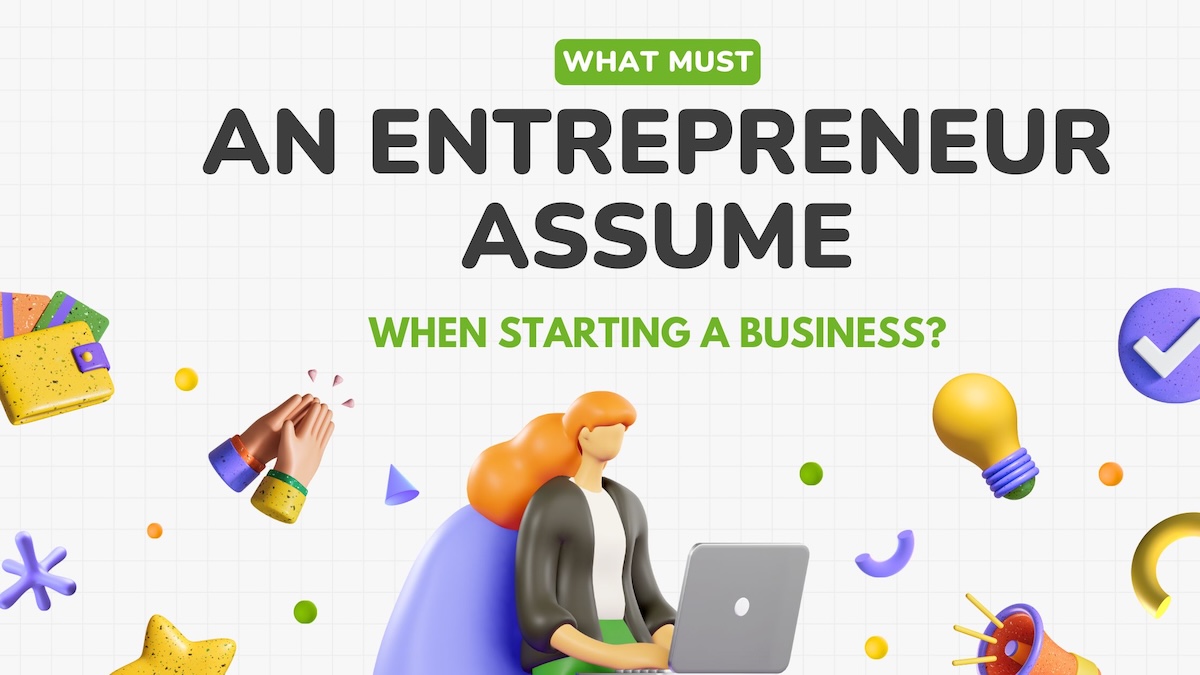
Starting a business is like setting sail on an unpredictable adventure. Every entrepreneur stands at the edge of a vast ocean of possibilities, armed with nothing more than a dream and a handful of assumptions. If you’re wondering, what must an entrepreneur assume when starting a business? you’re in the right place.
Imagine you’re about to embark on a journey without a detailed map. Sounds daunting, right? Yet, every successful founder has taken that leap of faith, trusting in assumptions that set the course for innovation and growth. These assumptions—whether about your target market, customer behavior, or even your own resilience—act as the compass guiding your early decisions. They are not certainties but starting points that can evolve as you learn and adapt.
In this post, we’ll unpack these core assumptions in a simple, straightforward manner. You’ll discover how each assumption plays a pivotal role in shaping your business strategy and why embracing uncertainty can actually be a strength. We’ll dive into real-life examples and practical tips that can help you validate or even pivot your initial beliefs. So, whether you’re a first-time entrepreneur or a seasoned business owner, get ready to challenge what you think you know and learn how to navigate the unpredictable waters of entrepreneurship with confidence.
1. The Nature of Entrepreneurial Assumptions
Starting a business means stepping into a world filled with uncertainties. Every entrepreneur eventually grapples with the question, “what must an entrepreneur assume when starting a business?” It’s not about having all the answers from day one, but about trusting in a series of informed assumptions that guide your journey. Think of these assumptions as the foundation upon which your entire business strategy is built.

…
1.1 Definition of Assumptions in Business
When we mention assumptions in the entrepreneurial world, we refer to the beliefs and predictions you make about your market, your customers, and the overall business environment. These assumptions aren’t mere guesses; they are carefully considered ideas based on market research, personal intuition, and sometimes even a leap of faith. Every business idea starts with an assumption—whether it’s that there’s a genuine need for your product or that your customers will respond positively to your service.
Imagine you’re planning a road trip. You might assume the weather will be clear, the roads will be smooth, and your fuel gauge will never hit empty. Similarly, in business, you make assumptions about key factors that shape your decisions. These assumptions help you set clear goals and form strategies that direct your efforts and investments.
1.2 Role of Assumptions in Shaping Business Strategy
Assumptions are the guiding light behind every major business decision. They influence everything—from the way you approach market research to how you design your product and market your brand. For instance, if you assume that there’s a rising demand for sustainable products, your business might prioritize eco-friendly practices and materials. Essentially, these assumptions act as the backbone of your strategy, helping you navigate early challenges and make informed decisions.
By testing these assumptions through small experiments or pilot projects, you can uncover insights that allow you to adjust your strategy before fully committing resources. This proactive approach minimizes risk and ensures that your business remains flexible and responsive to change. So, whenever you ponder, what must an entrepreneur assume when starting a business? remember that these assumptions are stepping stones that help you plan, execute, and adapt.
1.3 Key Types of Assumptions
To better visualize the core assumptions every entrepreneur faces, consider the following table that outlines the main types and their roles in shaping your business:
| Assumption Type | Definition | Impact on Business |
|---|---|---|
| Market Demand | The belief that there is a need for your product or service. | Drives product development and marketing strategies. |
| Customer Behavior | The assumption about how customers will interact with and respond to your offering. | Influences user experience and sales approach. |
| Competitive Landscape | Presumptions regarding the number and strength of competitors in your market. | Affects pricing, positioning, and differentiation efforts. |
| Financial Viability | An estimation of potential revenue, costs, and overall financial performance. | Guides budgeting, funding, and investment decisions. |
This table is a quick reference guide to help you understand the various assumptions you may need to make. Each type is like a piece of a puzzle that, when fitted together, forms a comprehensive picture of your business landscape.
Understanding these assumptions equips you with the clarity needed to steer your startup. They not only serve as the blueprint for your early strategies but also highlight areas where continuous learning and adjustment are essential. Embrace these assumptions as the initial steps on your journey, and remember—they’re not set in stone. As your business grows and market realities become clearer, revisiting and revising these assumptions is key to long-term success.
2. Understanding the Entrepreneurial Mindset
Entrepreneurship is not just about ideas and plans; it’s about how you think. A big part of answering what must an entrepreneur assume when starting a business? is embracing the right mindset. Let’s break down the key elements of an entrepreneurial mindset that help you thrive in uncertain waters.
2.1 Embracing Uncertainty
When you start a business, you must accept that not everything will be clear-cut. Embracing uncertainty means understanding that some things are beyond your control. It is like setting off on a journey without a complete map. You need to trust your instincts and be ready for surprises.
This mindset helps you stay calm and make smart decisions even when the future seems unpredictable. Moreover, accepting uncertainty opens the door to creativity and innovation. After all, every new idea starts in a space of the unknown.
2.2 Adaptability and Resilience
Adaptability and resilience go hand in hand. As you navigate through challenges, you must be flexible enough to change your plans. Imagine your business as a sailboat. When the wind changes, you adjust your sails. That is adaptability in action.
Resilience is your ability to bounce back after setbacks. It is about learning from mistakes and keeping your vision alive despite obstacles.
For instance, if your initial product doesn’t perform as expected, you can tweak your strategy and try a new approach. This combination of being flexible and staying strong is crucial when considering what must an entrepreneur assume when starting a business.
2.3 Vision vs. Reality
A clear vision drives you forward, but it needs to be balanced with real-world insights. Your long-term goals are like a lighthouse guiding your journey.
However, the market may present challenges that force you to adjust your course. The trick is to stay true to your vision while also being realistic about the current environment. This balance helps you set practical short-term goals that support your bigger dreams. In other words, you must assume that while your vision is important, you should always be ready to refine it based on market feedback.
2.4 Mindset Qualities at a Glance
To help you understand these concepts better, here is a table that outlines key qualities of an entrepreneurial mindset:
| Mindset Quality | Description | Example |
|---|---|---|
| Embracing Uncertainty | Accepting that not all factors are predictable. | Launching a new service without knowing the full market response. |
| Adaptability | Adjusting plans based on feedback and changing conditions. | Modifying your product features after hearing customer insights. |
| Resilience | Bouncing back from failures and learning from mistakes. | Recovering quickly from a failed marketing campaign. |
| Vision vs. Reality | Balancing long-term dreams with current market realities. | Sticking to a grand vision while making necessary tweaks based on sales data. |
This table is a handy reminder of the qualities that fuel a successful entrepreneurial journey. Embracing uncertainty, being adaptable and resilient, and finding a balance between your vision and reality are essential steps in answering what must an entrepreneur assume when starting a business.
By nurturing these mindset qualities, you position yourself to handle challenges gracefully. Each quality not only supports your decision-making process but also builds a strong foundation for your startup’s long-term success. Remember, developing the right mindset is an ongoing journey, much like the business itself.
3. Key Assumptions Every Entrepreneur Should Make
When you ask yourself, what must an entrepreneur assume when starting a business? one of the first steps is to lay down a set of core assumptions. These assumptions form the backbone of your strategy and guide your decisions as you navigate the business world. Here are five key assumptions every entrepreneur should embrace.

…
3.1 Assumption 1: The Market Needs Your Solution
When you launch your business, you must believe that your product or service will meet a real need. This assumption is crucial because it drives your entire strategy. Imagine planning a party without knowing if anyone will show up. You need to know that there is an audience waiting for what you offer.
To test this, invest in market research and speak with potential customers. Listen carefully to their feedback and let it shape your offering.
3.2 Assumption 2: Uncertainty and Risk Are Inherent
Every business journey involves a level of risk. It is important to assume that uncertainty is part of the process. Instead of fearing the unknown, see it as a chance to learn and grow.
Start by preparing for challenges. Create contingency plans and always be ready to change direction if needed. This way, you can face risks head-on and turn them into opportunities.
3.3 Assumption 3: Adaptability is Key to Success
The market can change in the blink of an eye. That is why you must assume that adaptability is crucial for success. Your original plan may need adjustments as new information emerges.
Stay flexible. If something is not working, do not hesitate to tweak your approach. Think of your business as a growing plant that must bend with the wind to thrive.
3.4 Assumption 4: Customer Feedback Drives Growth
Never assume you know it all. Instead, assume that customer feedback is essential to refining your product or service. Real insights come from listening to the people who matter most.
Set up easy channels for feedback. Use surveys, social media, or face-to-face conversations to understand your customers’ needs. Their input can be the spark that drives significant improvements.
3.5 Assumption 5: Long-Term Vision Guides Short-Term Decisions
Even as you manage daily tasks, keep your eyes on the long-term goal. Assume that every short-term decision should support your long-term vision. This balance ensures that you remain focused even when immediate challenges arise.
Regularly review your goals. Let your long-term vision shape every strategy and tweak your daily operations accordingly. This approach keeps you aligned with your ultimate mission.
3.6 Summary of Key Assumptions
Below is a table that sums up these essential assumptions along with a brief description and actionable tip for each:
| Assumption | Description | Actionable Tip |
|---|---|---|
| Market Needs Your Solution | Belief that your product or service fills a genuine need. | Conduct market research and validate with potential customers. |
| Uncertainty and Risk Are Inherent | Acceptance that risk is a natural part of entrepreneurship. | Develop contingency plans and prepare for unexpected changes. |
| Adaptability is Key to Success | The need to remain flexible and adjust strategies based on new information. | Continuously experiment and refine your approach. |
| Customer Feedback Drives Growth | Valuing insights from customers to improve your offering. | Establish channels for ongoing customer communication. |
| Long-Term Vision Guides Short-Term Decisions | Ensuring daily actions align with your broader business goals. | Regularly revisit and adjust your strategic vision. |
These assumptions serve as the building blocks of your business. They help you answer, what must an entrepreneur assume when starting a business?
By validating and adjusting these assumptions, you can transform them from simple beliefs into strong strategies that drive success. Embrace each assumption as a stepping stone on your entrepreneurial journey and be open to learning as your business evolves.
5. Validating and Challenging Your Assumptions
When you wonder, what must an entrepreneur assume when starting a business? you must remember that assumptions are not set in stone. They need testing, tweaking, and sometimes even a complete rethink. In this section, we will explore why it is important to test your assumptions and how you can do so effectively.
5.1 Importance of Testing Your Assumptions
Before you dive headfirst into business, it is crucial to validate your beliefs. Instead of taking your assumptions for granted, you should treat them as hypotheses that need proof.
For instance, if you assume that customers are eager for your solution, ask yourself: is this really true? Testing your assumptions minimizes risk and builds a solid foundation for your business. One effective method is to create a Minimum Viable Product (MVP). An MVP allows you to present a simplified version of your product to early users.
Their feedback will guide your next steps and help you refine your offering. By validating your assumptions, you can confidently answer, what must an entrepreneur assume when starting a business? while staying agile and responsive.
5.2 Methods for Validation
There are several practical ways to put your assumptions to the test. Below, we outline key methods that you can use to ensure your ideas hold water.
5.2.1 Market Research
Market research is a powerful tool that helps you understand your potential customers. You can conduct surveys, interviews, or focus groups to gather insights. Ask simple questions to gauge interest and willingness to pay. This approach allows you to confirm if your product or service meets an actual need.
5.2.2 Lean Startup Principles
Lean Startup principles encourage you to build, measure, and learn in quick cycles. Start with a basic version of your product and release it to a small group of users. This iterative process enables you to gather feedback quickly and make necessary adjustments. It also reduces waste by preventing you from over-investing in untested ideas.
5.2.3 Data-Driven Decision Making
Rely on analytics to back up your assumptions. Use tools that track user behavior, sales, and market trends. Data-driven decisions can help you spot patterns and identify areas that need improvement. This method ensures you are not basing decisions solely on intuition but on real numbers.
To summarize these methods, here is a table that highlights each validation approach along with a brief description and its key benefit:
| Validation Method | What It Involves | Key Benefit |
|---|---|---|
| Market Research | Surveys, interviews, and focus groups to gather insights. | Understand customer needs and preferences. |
| Lean Startup Principles | Building an MVP and iterating based on user feedback. | Quickly refine ideas and reduce wasted resources. |
| Data-Driven Decision Making | Using analytics to monitor behavior and trends. | Make informed decisions based on actual data. |
5.3 Adjusting When Assumptions Fail
Not all assumptions will hold up under scrutiny. It is essential to be ready to adjust or even abandon ideas that do not work. Think of your business like a GPS system. Sometimes you must change your route when you encounter roadblocks.
When feedback or data shows that your assumption is off, pivot quickly. Revisit your hypothesis, gather more data, and update your strategy accordingly. This flexibility can be the difference between a failing startup and a thriving one.
Remember, the journey of entrepreneurship is not a straight line. Every test, every failure, and every pivot brings you closer to a robust and successful business. By continuously validating and challenging your assumptions, you set yourself up to answer confidently the question, what must an entrepreneur assume when starting a business? Keep testing, learning, and adapting.
6. The Risks of False Assumptions
Every entrepreneur eventually faces the harsh reality that not all assumptions will hold true. False assumptions can lead to missteps that may cost time, money, and even the future of your business. In this section, we explore common pitfalls, how these errors affect your operations, and strategies to overcome them.

…
6.1 Common Pitfalls
False assumptions can misguide your decisions in many ways. For example, you might overestimate your market size, misjudge customer preferences, or underestimate the strength of competitors. Such mistakes can push your business off course. Instead of relying solely on gut feelings, it is important to verify your assumptions with data and real-world feedback. By doing so, you can avoid investing resources in ideas that might not resonate with your target audience.
6.2 Impact on Business Operations
When assumptions prove to be false, the consequences can spread across every aspect of your business and even health. You might end up developing a product that misses the mark or executing marketing strategies that fall flat. In simple terms, false assumptions can cause:
- Wasted resources on underperforming products
- Delays in product launches
- Missed opportunities in emerging markets
These impacts emphasize why it is crucial to constantly reexamine your assumptions and adapt based on evolving market realities.
6.3 Mitigation Strategies
To protect your business from the downsides of false assumptions, it is important to implement strategies that help identify and correct them early. Consider these practical tips:
- Regular Reviews: Make it a habit to revisit your assumptions as new data becomes available.
- Stay Agile: Be prepared to pivot quickly if feedback or data suggests a change in direction.
- Gather External Feedback: Use customer surveys, industry experts, or mentor advice to challenge your beliefs.
- Data-Driven Decisions: Lean on analytics to validate your assumptions rather than relying solely on intuition.
Below is a table that summarizes common pitfalls, their potential impacts, and effective mitigation strategies:
| Common Pitfall | Impact on Business Operations | Mitigation Strategy |
|---|---|---|
| Overestimating market size | Resource misallocation and overproduction | Conduct thorough market research and realistic forecasting |
| Misjudging customer behavior | Poor product design and low customer satisfaction | Engage with customers and gather regular, honest feedback |
| Underestimating competition | Weak market positioning and ineffective strategies | Perform competitive analysis and differentiate your offering |
| Ignoring data in decision-making | Wasted investments and missed growth opportunities | Use data-driven tools to guide business decisions |
By understanding these risks and actively working to mitigate them, you can safeguard your business against potential setbacks.
Remember, the goal is not to eliminate assumptions entirely but to manage them wisely. With a proactive approach, you can turn challenges into opportunities and keep your business moving forward, even when things don’t go as planned.
7. Practical Tips for Entrepreneurs to Manage Assumptions
When you start a business, managing assumptions is key. You need to stay sharp, learn continuously, and keep an open mind. In this section, we will explore practical ways to manage your assumptions. Below, you will find useful tips that you can put into action right away.
7.1 Continuous Learning
It is important to never stop learning. The business world changes fast. Staying informed helps you adapt quickly. Here are some ways to keep learning:
- Read industry news and reports.
- Attend webinars and workshops.
- Listen to podcasts and follow expert blogs.
- Join networking groups and entrepreneurial communities.
- Ask questions and seek feedback.
These practices keep you updated and ready for new challenges.
7.2 Embracing a Culture of Experimentation
A willingness to experiment can drive your success. Testing new ideas in small steps helps you see what works. Embrace mistakes as learning opportunities. Consider these steps:
- Run small pilot tests before full-scale launches.
- Try out new ideas on a limited scale.
- Learn from both successes and failures.
- Adjust your approach based on real feedback.
- Keep experiments simple and focused.
This mindset helps you improve continuously and grow your business.
7.3 Utilizing Tools and Frameworks
Using proven tools can simplify your work. They help you organize your thoughts and test your assumptions. Explore these practical methods:
- Apply the Lean Startup method.
- Use the Business Model Canvas.
- Perform a SWOT analysis.
- Rely on data to guide your decisions.
- Collect and analyze customer feedback.
These tools can turn complex ideas into manageable tasks.
7.4 Building a Resilient Team
A strong team supports your journey. Working with people who adapt and learn can make a big difference. Focus on building a team with these qualities:
- Hire team members who are open to change.
- Encourage clear and honest communication.
- Value every team member’s input.
- Support each other during challenges.
- Promote a culture of continuous improvement.
A resilient team helps you handle setbacks and keep moving forward.

…
By following these practical tips, entrepreneurs can better manage assumptions. Keep learning, experiment often, use the right tools, and build a strong team. These steps will help you navigate your entrepreneurial journey with confidence and ease.
FAQs: Answers to Common Questions About: What Must an Entrepreneur Assume When Starting a Business?
FAQ 1: What is the most important assumption an entrepreneur should make?
The key assumption is that your product or service meets a genuine market need. This belief drives your strategy and guides your early decisions. If you aren’t solving a real problem, even the best ideas may not find traction.
FAQ 2: How can I validate my entrepreneurial assumptions?
You can test your assumptions by conducting market research, building a Minimum Viable Product (MVP), and gathering direct feedback from potential customers. These steps allow you to learn quickly and adjust your approach based on real data.
FAQ 3: What should I do if my assumptions turn out to be false?
If your assumptions prove incorrect, don’t panic. Instead, pivot quickly. Review the feedback, learn from your mistakes, and adjust your strategy. Flexibility is key—being open to change can transform a setback into a stepping stone.
FAQ 4: How do I balance my long-term vision with short-term decisions?
Your long-term vision should guide every decision, but you need to break it down into achievable short-term goals. Regularly revisit and refine your strategy based on market feedback. This approach keeps you aligned with your ultimate mission while adapting to current realities.
FAQ 5: What role does resilience play in entrepreneurship?
Resilience is essential. It enables you to bounce back from setbacks and continuously test and refine your assumptions. A resilient mindset helps you learn from failures and keep pushing forward, turning challenges into opportunities for growth.
Conclusion: What Must an Entrepreneur Assume When Starting a Business?
As you set out on your entrepreneurial journey, remember that assumptions are not fixed rules—they are simply starting points. They help you answer the question, what must an entrepreneur assume when starting a business? Yet, they need constant testing and adjustment.
Keep these key ideas in mind:
- Embrace Uncertainty: Accept that not all answers are known.
- Stay Agile: Learn, adapt, and pivot based on real feedback.
- Use Data: Let the numbers guide your decisions.
- Listen to Your Team and Customers: They offer insights you might miss.
Below is a creative table to serve as your quick guide—a compass for your entrepreneurial journey:
| Compass Direction | Key Takeaway |
|---|---|
| North (Vision) | Keep your long-term goals in sight. |
| East (Learning) | Embrace new insights and knowledge. |
| South (Action) | Turn ideas into real, small steps. |
| West (Adaptability) | Be ready to change direction when needed. |
This table is a reminder to balance your vision with action, learning, and adaptability. Every assumption you test brings you closer to a thriving business. Now is the time to reflect on your ideas and challenge your assumptions. What will you do differently tomorrow?































